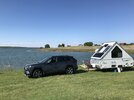Since we've been towing for over three years the novelty of taking pictures and logging my stats has worn off. I don't have "hard documentation" of those two trips. But here is a link to some stats from our first cross country trip with our camper.
Total round trip 6118 miles Pulling trailer Miles 2924 kWh 1466 wH/mile 489 * ** *** Ra...

tinpoodle.blogspot.com
The trailer is a 2018 Bowlus Road Chief. 24'. ~2300-2500lb unladen. Maximum axle capacity 3000-3500lb.
*Caveat. I have an MX, not an MY. My original post in this thread was just the relative change in power consumption while towing an open utility trailer. I'm sure the absolute numbers of the MY are different than the MX. But the concepts are the same.
**The numbers in the trip above were with a MX90D. As was the utility trailer trip.
***The 600+ mile trip was with a MX100D. By upgrading to the 100kWh pack I've been able to increase my max towing range by ~20% (200 miles +/-). The larger pack with the newer battery cell chemistry also allows for faster charging and fewer charging stops.
I also have a feeling that the newer pack and chemistry, even though slightly heavier than the original pack, has better efficiency than the original pack chemistry. This is based on the fact I've been able to travel at higher speeds while using the same wH/mi compared to the original pack. (Though I haven't been able to document in any systemic way yet.)
****The post above was in response to the statement, "Towing in any Tesla is completely impractical if you are going > 50 miles in either direction."




